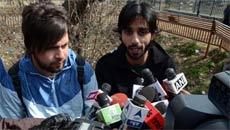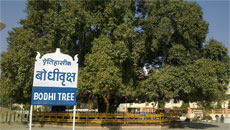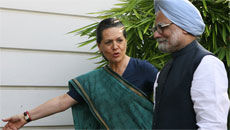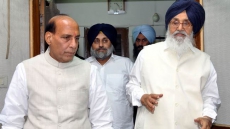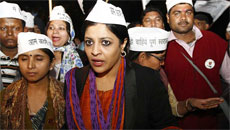Hell-bent on entering Britain, a group of young Punjabis board a container truck in Amritsar for their tough journey to jobs and riches. Freezing and bouncing, they arrive in Kabul, Afghanistan. After a brief rest, they trundle to Krasnoyarsk in Russia's Siberia. From here, the container truck rolls to Russian capital Moscow. The next stop is Belarus capital Minsk, before entering Poland for Warsaw and then on to Germany and finally to Belgium or France
to take the ferry to Britain.
Shamlal Puri, a veteran London-based international journalist and a novelist, has tracked, interviewed and recorded the travails of these Indians at every stopover from Amritsar to London in a brilliant work of fiction - fiction based on fact -
titled "The Illegals: Visa-Less, Homeless, Hopeless - Striving for the Good Life" (jointly published by Crownbird Publishers and Har Anand Publications), launched in Delhi and London a few days ago.
This is the hair-rising tale of 12 Indians cheated by a dodgy agent who extracts big money from them on false promises and sent them off on “the donkey route” through Russia and Europe to Britain.
Once in a while, the drivers stop at isolated spots to relieve themselves, stretch their legs and maybe sip some tea. Many of the travelers fall sick with no medical care during the real boneshaker drive. The money paid to the Indian immigration agent lasts halfway. Stranded in the middle of nowhere, they are forced to pay their own way for
the rest of the trip. They beg, borrow and steal to pay the truckers.

The real test comes in crossing the English Channel as the police use digital scanners to measure the heat inside the containers to determine if any people are hiding. To avoid detection, they wrap themselves in thick, black plastic bags and are drugged. Sometimes, they suffocate to death. One tried to jump on the roof of the chunnel train from a bridge in France, missed the fast moving train and died. Less than half of them survive the long road trip. If discovered during the trip,they are imprisoned and deported.
When they flew to Britain for illegal entry, they were dubbed as 'kabuttars' or pigeons. If they go by containers, they are called 'faujis' or soldiers battling against impossible odds. After reaching Britain, their ordeal takes a new twist as they have no legal papers to work, no home, not even proper meals. So now they are called 'illegals', living in fields, under motorway bridges, in four-wheeler bins and even in cemeteries in Southall, west London, eating from soup kitchens or gurudwaras and looking for work for a pittance. If they are caught by the authorities, they are deported and their employer fined 10,000 pounds per illegal worker.
"After reporting on 'faujis' for many years, my late father, Hussan Chand Puri, encouraged me to write a book to record their problems so that the Indian children and their parents do not have to go through this suffering," Puri said.
"Thesedesperate young men want to get away from Punjab at any cost. Jobless, they just want to start a new life no matter what the consequences”.

"Unfortunately, their worst enemies are the Indian British who employ - rather exploit - them with far less than legal wages as they risk a huge fine if they get caught. Many small businesses have gone bankrupt by employing these faujis," he added.
"Interviewing them is tough as they don't trust anyone. They sound an alarm and threaten violence whenever a stranger comes to where they are sleeping overnight in the open fields even during winter or under a bridge. Desperate, homeless, jobless and homeless in cities, they sleep on the streets, in abandoned homes, garbage bins or even a cemetery. I joined a charity to reach out to them and spent time under bridges and in cemeteries in freezing winter listening to their painful stories. One of them is always alert as a lookout for a police raid during the night.
"Depressed and jobless in the UK, they seek solace with drugs. To survive the cold, they cover their bodies with oil. If they do not get meals from a soup kitchen they survive on tins of dog food scrounged from the bins or they go hungry," Puri said.
"The illegals do not want to return to India because of the shame they would bring to their families and the huge loans, up to Rs.5 million, taken to pay the human traffickers and immigration agents. They try to enter into sham marriages with British and Indian women solely for obtaining British passports. Again, they are duped by some women.

Among the illegals are Indian engineers, lawyers, graduates, pharmacists and well-educated men. British immigration authorities raid these camps arresting, detaining and deporting them back to India. Others commit suicide. The book lifts the lid off the lives of paperless immigrants. Its drama and action does not stumble.
Puri said: "Even if just one young man drops the idea of going to Britain by the donkey route after reading this book, my whole effort would be worthwhile."
